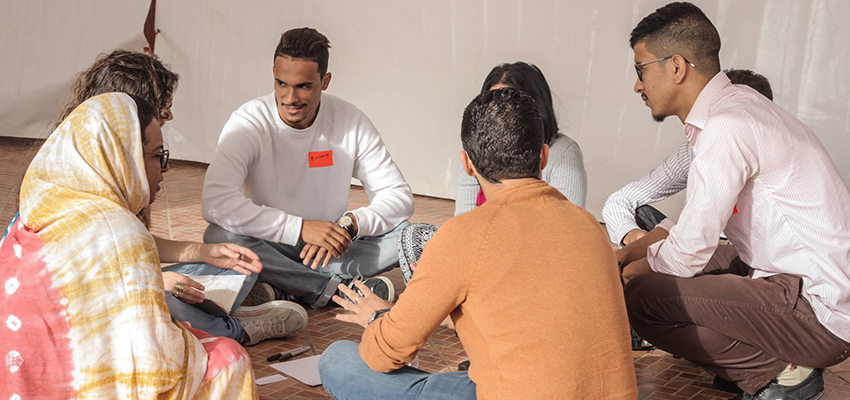
The MIT Practical Impact Alliance (PIA) Co-Design Summit is organized annually in different emerging countries with the aim of disseminating MIT D-Lab's co-design methodology developed to foster the development of collaborative solutions to local socioeconomic challenges.
The 2018 PIA Co-design Summit will take place in November 2018 in the city of Laâyoune in collaboration with the Phosboucraa Foundation. The initiative is part of a development strategy put in place by the foundation with the aim of boosting the socio-economic network in the southern provinces through the engagement of young people in entrepreneurial activity.
The Phosboucraa Foundation, since 2016 a a member of PIA's international network of practitioners in social innovation, supports the organization of this summit through its economic and logistical support to project planning and execution activities, as well as through the commitment of its network of local and national partners to take part in this new model of collaborative development.
The project is supported locally by the Laâyoune Learning Center (LLC) team, which is responsible for liaising with the Phosboucraa Foundation, supporting the MIT team in recruiting local participants, and engaging local strategic stakeholders around the project and ensuring the logistical execution of training events.
The main objectives of the project are articulated along three axes of intervention:
- KNOWLEDGE - Development of local capacity to teach and practice D-Lab methodologies for youth development and entrepreneurial ideas.
- MINDSETS - Development of a new mindset towards local entrepreneurship that reinforces the notions of optimism, curiosity, empowerment, collaboration, and inclusion.
- CONNECTIONS - Development of a network of stakeholders ready to collaborate to strengthen and energize the entrepreneurial ecosystem in the region.
The project is spread over an 18-month period comprising three main stages:
- Step 1: Project Definition and Design (January-June 2018) - Includes editing of the project team, definition of objectives as well as project theory of change, characterization of the local beneficiary profile, and identifying emerging business opportunities for regional industries.
- Step 2: Project Planning and Implementation (July-December 2018) - Including recruitment of local, national and international participants; and their preparation through training strategies adapted to each audience.
- Step 3: Monitoring and Evaluation of the Project (January to June 2019) - Includes monitoring and support of the summit's emerging projects, monitoring of potential partnerships catalyzed by the summit, as well as evaluation of the summit's results 6 months after its implementation.
The second stage of the project includes conducting two training events in Laâyoune:
- October 15 to November 2: MIT D-Lab will conduct a Creative Capacity Building (CCB) training aimed at introducing 30 young aspiring entrepreneurs to the concept of Design Thinking through innovation technology. In parallel, D-Lab will also offer training of trainers in the CCB methodology to 15 Moroccan professionals in entrepreneurial training. The purpose of these trainings is to prepare the participants for the participatory design practice, and to develop the capacity of the local ecosystem to sustain the D-Lab CCB methodology in the region.
- November 25th to December 2nd: MIT D-Lab will lead the Co-design Summit which will be attended by 12-15 members of the international PIA network, 12-15 stakeholders from the Moroccan entrepreneurial ecosystem and 12-15 aspiring entrepreneurs from the region.
This summit will use the D-Lab Co-design methodology to identify and develop entrepreneurial ideas for the development of the local economy, and present an opportunity to catalyze relationships and conversations around the development of the innovation and entrepreneurship ecosystem in the region.
At the end of the summit, MIT D-Lab will propose to the Phosboucraa Foundation a plan for monitoring and supporting the summit projects that will be implemented by the foundation in the following months. The design of a subsequent phase of the project will be considered by MIT and the Phosboucraa Foundation based on the results of this first intervention.
For more information on the MIT PIA Co-Design Summit, please contact Saida Benhayoune, Program Director, MIT D-Lab.

